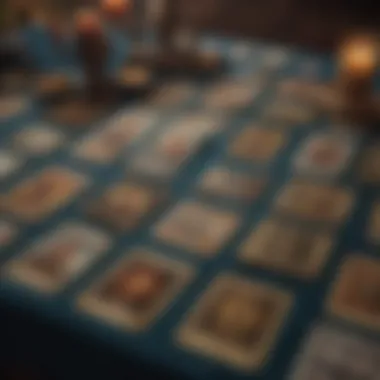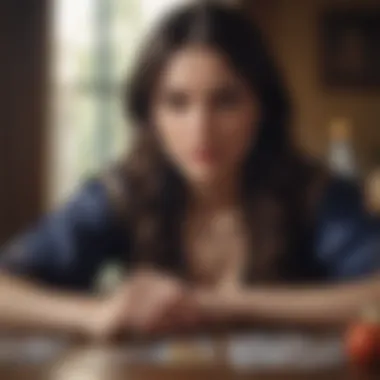Mastering Tarot Questions for Deeper Insights


Intro
Understanding tarot questions is vital for effective tarot readings. These questions determine the direction and depth of the insights revealed by the tarot cards. The ability to ask focused and meaningful questions can significantly enhance the clarity of the messages received during a reading.
In this guide, we will explore various aspects of formulating tarot questions. This includes examining types of questions, the importance of phrasing, and practical examples to consider.
The pursuit of clarity in tarot not only benefits the reader but can also lead to profound personal growth and intuitive insights. Let's delve in.
Zodiac Profiles
Overview of Each Sign
Each zodiac sign offers unique attributes that can influence how one approaches tarot readings. Understanding these attributes can refine how questions are formulated based on personal experiences and challenges.
Personality Traits
Identifying personality traits can enhance the effectiveness of tarot inquiries. For instance, Scorpios are often intense and passionate, which may lead them to ask deeper questions about transformation. In contrast, Geminis may prefer lighter, more exploratory questions due to their curiosity.
Strengths and Weaknesses
Strengths and weaknesses greatly affect how questions are formed. An Aries may approach questions with boldness, while a Cancer may consider emotional depth. Recognizing these strengths and weaknesses allows for tailored questions, ultimately resulting in more meaningful readings.
Compatibility Insights
Love and Relationships
Understanding zodiac compatibility can guide queries related to relationships. For example, if a Leo is questioning compatibility with a Taurus, being aware of their differences can help frame questions about balance and compromise.
Friendship Compatibility
Likewise, friendship compatibility can inform questions about dynamics. An Aquarius may inquire about the depth of friendships with earth signs like Virgo. Such insights can lead to deeper understanding.
Workplace Dynamics
Workplace situations also benefit from compatibility insights. An employee might ask about their relationship with a Capricorn superior, allowing for focused questions on professional growth and collaboration.
Astrological Events
Monthly/Weekly Horoscope Breakdown
Regularly checking horoscopes offers guidance on what types of questions to ask during different periods. The new moon, for example, is a favorable time for questions about new beginnings.
Notable Celestial Events
Celestial events such as eclipses or retrogrades can bring about significant inquiries. During a retrograde, questions about past decisions are common, helping individuals reflect and reassess.
How to Prepare for Astrological Shifts
Preparation for astrological shifts involves intentional question framing. Anticipating how these shifts may affect one's life can shape pertinent questions, enhancing the reading experience.
Foreword to Tarot Questions
Understanding tarot questions is fundamental for anyone engaging in tarot reading. The nature of questions can fundamentally alter the direction and clarity of a reading. Formulating effective questions is a skill that can deepen insights and enhance the overall experience with tarot. Each question acts as a lens, allowing the reader to focus on specific areas of concern or interest.
The Importance of Questions in Tarot
Questions form the backbone of any tarot reading. They guide the spread and influence the interpretation of the cards. When questions are clear and purposeful, the insights gained from the reading tend to be more meaningful and applicable. It is crucial to recognize that not all questions have the same weight.
Here are a few key points about the importance of well-phrased questions:
- Clarity: Clear questions lead to clearer answers. Ambiguity can result in vague interpretations.
- Focus: A well-defined question directs the reading to specific aspects of life, maximizing the benefit of the session.
- Intent: The energy behind a question can influence the outcome. Questions that emerge from genuine curiosity tend to yield richer insights.
How Questions Shape Tarot Readings
The quality of questions can significantly shape the reading experience. The type of question asked can set the tone for the entire session. For example, a yes or no question may lead to a straightforward answer, often missing the nuances available in a more open-ended inquiry. Understanding how to structure questions can allow readers to uncover layers of understanding, rather than simply surface-level insights.


Factors to consider when crafting questions include:
- Goal of the Inquiry: Consider what you truly wish to understand or solve. This awareness helps tailor questions accordingly.
- Level of Detail: More detailed questions often encourage a more comprehensive reading. Instead of asking, “Will I find love?” a more specific question like, “What blocks me from finding love?” invites deeper exploration.
- Open vs. Closed Format: Open-ended questions promote broader insights, while closed questions can limit the potential for nuanced answers.
The relationship between questions and tarot readings is crucial. By refining how questions are posed, readers increase the likelihood of gaining insights that genuinely resonate with their situations.
Types of Tarot Questions
Understanding the types of tarot questions is crucial for anyone engaging in tarot reading. Each type serves a specific purpose and can lead to different insights based on how they are phrased. By recognizing these categories, practitioners can tailor their inquiries to elicit more meaningful responses from the cards. This section delves into the various forms of questions that can be leveraged during a reading, allowing one to navigate the complexities of their life situations more effectively.
Open-Ended Questions
Open-ended questions are among the most insightful inquiries you can pose during a tarot reading. These questions typically begin with 'how' or 'what,' encouraging an exploration of situations rather than a simple yes or no response. For instance, asking “What should I be aware of in my career?” opens pathways for a comprehensive analysis. This approach invites the tarot to reveal underlying dynamics and complexities rather than just providing surface-level answers.
Benefits of open-ended questions include:
- Encouraging deeper exploration: They prompt the reader and the cards to consider various facets of a situation.
- Facilitating personal growth: Responses can highlight areas for self-improvement and development, leading to transformative insights.
- Engaging intuition: Open-ended questions allow for intuitive guidance, leading to unexpected revelations.
Yes or No Questions
Yes or no questions present a stark contrast to their open-ended counterparts. These questions aim to gain quick and straightforward responses, making them useful in situations requiring decisive clarity. Examples include inquiries like “Will I get the promotion?” or “Is this relationship beneficial for me?” While they can offer immediate answers, relying solely on this question type may limit the depth of a reading.
Considerations for using yes or no questions:
- Their simplicity can sometimes overlook nuance: Complex situations may require broader exploration.
- They provide immediate clarity: For urgent matters, a clear-cut answer can be vital.
- They can lead to further inquiries: A simple 'yes' or 'no' might prompt additional questions for deeper understanding.
Clarifying Questions
Clarifying questions serve to refine and focus an inquiry. When there is uncertainty or ambiguity, these questions can help pinpoint the specific aspect of a situation that needs further exploration. For example, asking “What do I need to understand about my current relationship?” clarifies the intent and directs the reading toward meaningful insights.
The role of clarifying questions includes:
- Narrowing down options: They help define a pathway, making it easier to interpret the cards’ meanings accurately.
- Enhancing the reading’s focus: This type of inquiry ensures that the reading addresses exactly what the querent needs to know.
- Facilitating context: Understanding the context of the question can lead to richer interpretations and guidance.
Specificity in Questions
Specificity in questions is essential for obtaining clear and actionable insights. Vague questions often yield vague interpretations, making it challenging to draw useful conclusions. For example, instead of asking “What should I do about my job?” it is more effective to ask “How can I improve my relationship with my boss?” Specific inquiries direct tarot readings to focus on concrete matters and concerns, ultimately leading to more applicable advice.
To enhance specificity in questions:
- Identify key issues: Focus on what is truly important in your situation.
- Use precise language: Avoid ambiguous terms that could lead to various interpretations.
- Be mindful of scope: Tailor the questions to fit within a reasonable domain of inquiry without becoming overly broad.
In summary, understanding these different types of tarot questions helps to cultivate a richer and more detailed reading experience. Focusing on open-ended inquiries, yes or no questions, clarification, and specificity allows tarot users to extract depth and clarity from their readings. This knowledge fosters an effective dialogue with the tarot, promoting personal growth and insightful exploration.
Crafting Effective Tarot Questions
Crafting effective tarot questions is a crucial aspect of the tarot reading process. The manner in which a question is framed can significantly influence the insights that emerge from a reading. A well-crafted question acts as a guide, directing the reader's focus and establishing a constructive atmosphere for reflection. This part of the article will explore the key elements involved in formulating impactful tarot queries, emphasizing clarity, intent, and the avoidance of leading questions.
Phrasing for Clarity
When formulating questions for tarot readings, phrasing is essential for achieving clarity. Ambiguous or overly complex questions can lead to indistinct answers and misinterpretations. For instance, consider the difference between asking, "What should I do about my job?" and "What steps can I take to improve my current job situation?" The latter is clearer and more specific, allowing the cards to provide focused guidance.
To improve clarity, one might use:
- Simple language that conveys the core inquiry.
- Direct phrasing that avoids vague terms.
- A structure that keeps the question concise.
Using straightforward language ensures that the reader understands the focus of the inquiry without getting lost in unnecessary details.
Focusing on Intent
Focusing on the intent behind a question is another key component in crafting effective tarot queries. The question should reflect personal needs, goals, and desired outcomes. This clarity of purpose allows cards to connect with the individual’s situation more authentically.
For example, a question such as, "What do I need to learn about my relationship?" embodies a quest for understanding, while a question like, "Will I be happy in my relationship?" may lead to superficial answers. The focus should be on personal growth and the underlying reasons for the inquiry rather than just seeking confirmation or avoidance of difficult truths.
Additionally, consider the following when focusing on intent:


- Understand what emotion drives the question.
- Clarify personal motivations and expectations.
- Reflect on how the answer may impact personal development.
Avoiding Leading Questions
Leading questions can taint the integrity of a tarot reading, pushing the reading toward a predetermined outcome. These questions often suggest a specific answer or bias the interpretation of the cards. An example of a leading question might be, "Why is my partner being unfaithful?" This presumes infidelity without room for exploration of other circumstances.
Instead, one could ask, "What dynamics currently exist in my relationship?" This alternative allows the reader to explore various possibilities and encourages a deeper investigation into the relationship dynamics at play.
To ensure that your questions are not leading, consider moderate phrasing and:
- Avoid assumptions about the outcome.
- Frame questions neutrally to allow for various responses.
- Aim to open discussions rather than close them off.
Crafting effective tarot questions involves clarity, intent, and neutrality. By focusing on these elements, you prepare the ground for profound insights and meaningful revelations through the tarot.
Common Themes in Tarot Questions
Exploring common themes in tarot questions is crucial for any serious tarot practitioner. These themes reveal patterns that can help individuals focus their readings. Certain areas of life, such as love, career, and personal growth, often emerge as primary concerns. Understanding these recurring topics allows readers to tailor their questions more effectively. This leads to better insights and clarity during readings. By identifying common themes, one can engage deeper with the tarot.
Love and Relationships
Love serves as a significant theme in tarot questions. Many seek guidance on romantic partnerships, friendship dynamics, or family connections. Questions in this realm may include:
- What should I understand about my current relationship?
- How can I improve my love life?
- Is my partner right for me?
These queries help address underlying feelings and concerns. Tarot cards can illuminate paths forward or recognize potential obstacles. Guidance may encourage self-reflection, prompting individuals to consider their needs and desires. This insight can be transformative in fostering healthy connections.
Career Path and Opportunities
Career-related queries are another prevalent theme in tarot. Individuals often seek clarity regarding their professional lives. Common questions include:
- Am I in the right job?
- What opportunities should I explore?
- How can I achieve my career goals?
By asking such questions, users can gain valuable perspectives on their work situations. Tarot has the potential to unveil practical considerations, highlight strengths, and suggest new directions. This dimension can be especially beneficial during career transitions or times of uncertainty.
Personal Growth and Self-Understanding
The realm of personal growth is fundamental in tarot. Many individuals use tarot to explore their inner thoughts and feelings, striving for greater self-awareness. Typical questions might be:
- What do I need to change in my life?
- How can I develop my potential?
- What fears are holding me back?
These inquiries not only promote self-reflection but also encourage personal evolution. Tarot readings can bring to light subconscious patterns and motivations, fostering a deeper understanding of oneself. This exploration can empower individuals to make informed choices in their lives, resulting in meaningful transformation.
In summary, common themes in tarot questions provide valuable insight and enhance the reading experience. By focusing on love, career, and personal growth, individuals can craft more effective, purposeful inquiries.
Practical Examples of Tarot Questions
Practical examples of tarot questions serve as a tangible bridge connecting the theory of tarot to real-life applications. They provide clarity by allowing practitioners to see how various question formats can yield different insights and guidance. By examining specific scenarios, readers can gain a more nuanced understanding of how to approach their own tarot inquiries, leading to improved readings and personal growth.
Examples for Personal Situations
When crafting questions related to personal situations, it is essential to focus on clarity and intent. Here are some examples that illustrate this point:
- "What can I do to enhance my well-being during challenging times?"
- "How can I navigate my current feelings of uncertainty?"
- "What steps should I take to build my confidence?"
- "What can I learn from my past experiences that will support me now?"
These questions are open-ended, inviting the tarot to offer detailed insights rather than simplistic answers. They encourage exploration of personal feelings and circumstances, enabling deeper self-reflection and understanding.
Examples for Relationship Queries
Relationship queries often revolve around emotions and dynamics. Crafting thoughtful questions can facilitate deeper readings. Consider the following examples:
- "What is my partner trying to communicate that I may be missing?"
- "How can I strengthen trust in my relationship?"
- "What do I need to understand about myself to attract a healthy partnership?"
- "What challenges do we currently face, and how can we address them?"
These relationship-focused questions emphasize understanding and growth. They encourage the querent to reflect on their own role and perspective, which can lead to positive changes.
Examples for Career Guidance


In the professional realm, tarot questions can guide decisions and highlight potential opportunities. Here are some examples:
- "What skills should I develop to advance in my career?"
- "How can I create a more fulfilling work environment for myself?"
- "What obstacles might I face in pursuing my career goals, and how can I overcome them?"
- "What does this new opportunity signify for my professional journey?"
These specific questions allow for a focused exploration of career aspirations and concerns. They are designed to uncover insights that can help in making informed decisions.
Remember: Crafting the right questions can transform your tarot reading experience, enhancing both personal understanding and intuitive insights.
The Role of Intuition in Formulating Questions
In the intricate practice of tarot reading, intuition plays a pivotal role, especially in formulating questions. Intuition is not merely a random whim; it is a deep-seated understanding that arises from personal insight and experience. Effective tarot questions often stem from this awareness. Intuition helps the reader connect with their inner thoughts and emotions, guiding them toward more fruitful inquiries. By tapping into intuitive abilities, one can elevate the quality of their tarot sessions and achieve deeper insights regarding their questions.
Listening to Your Inner Voice
Listening to your inner voice serves as an essential step in creating meaningful tarot questions. This inner voice often echoes feelings, symbols, and messages that might not be readily apparent on the surface. It requires an openness to receive these whispers of intuition. Take a moment to quiet the mind before engaging with the cards. This stillness can open pathways to understanding unresolved emotions and thoughts. Consider these elements when listening to your inner voice:
- Personal Relevance: Ask yourself what matters most. Personal connections deepen the quality of your inquiries.
- Intuitive Signals: Note any physical sensations or emotional responses that occur as you contemplate a question. These sensations can provide hints on which direction to take.
- Past Experiences: Reflect on previous experiences. They can inform the current situation and inspire targeted questions.
By prioritizing these elements, readers can commence their tarot journey with a more profound awareness of their intuition.
Using Feelings to Guide Questions
Feelings can be powerful indicators when formulating tarot questions. Emotions often offer insight that rational thought might overlook. Observing feelings without judgment allows them to guide your inquiry process effectively. Consider these important aspects:
- Emotion as a Compass: Emotions can serve as a directional tool. Feeling anxious about a situation may lead you to ask about potential outcomes.
- Clarity in Emotions: Distinguishing between various feelings can provide clarity. For instance, if a feeling of joy arises, it may inspire exploratory questions related to opportunities.
- Shifts in Mood: Recognizing how mood fluctuates during a reading can help refine questions. This feedback loop can enhance how you engage with the cards and the resulting insights.
Relevant emotions and feelings can act as both motivators and guides, helping readers fine-tune their tarot questions for richer insights.
Evolving Your Questions Over Time
In the journey of tarot reading, the significance of evolving your questions cannot be overstated. As individuals encounter new experiences and challenges, the queries posed to tarot should mirror this growth. Formulating questions that evolve with personal circumstances allows for a deeper understanding of oneself and a clearer insight into the situations at hand. This reflective practice holds considerable benefits, enhancing the effectiveness of readings.
Changes in one's life, whether they be transitions in career, relationships, or personal development, necessitate a reevaluation of the questions directed towards tarot. Adapting the inquiries according to these shifts ensures that the readings remain relevant and impactful. It fosters a movement away from static inquiry, encouraging a dynamic interaction with the tarot cards.
Moreover, evolving questions can lead to broader personal insights. As new situations arise, different aspects of the self may come to the forefront, which can significantly influence the type of guidance one seeks from tarot. An evolving query reflects a growing awareness of personal needs and desires, encouraging self-discovery.
"To ask the right questions is perhaps the most important thing in a tarot reading."
One should also consider that habitual questions can lead to repetitive answers. Over time, this can diminish the significance of the readings. By examining and changing the questions, one can avoid falling into predictable patterns. This not only retains the novelty of the readings but also opens pathways to profound revelations.
Adapting Questions to Life Changes
Adapting questions to align with life changes is crucial for maintaining the relevance of tarot readings. Life is inherently fluid; thus, our inquiries should reflect this continuity. When significant events occur—like a new job, relationship changes, or personal challenges—it's important to craft questions that address these new realities. For instance, shifting from a question about a stable job situation to querying about potential career shifts can provide tailored guidance during that transition.
Additionally, adapting questions is also about acknowledging emotional states. For example, someone might originally ask about relationship stability. If issues arise, it could be beneficial to focus on questions about communication or personal boundaries. This shift not only reflects a deeper understanding of the relationship dynamics but also opens dialogue for targeted insight.
Understanding that questioning goes beyond static inquiry encourages proactive engagement with tarot. It allows tarot practice to evolve, fostering a more personalized experience.
Reflecting on Previous Readings
Reflecting on previous readings can significantly inform future inquiries. When individuals revisit past tarot sessions, they can gain insights into recurring themes and patterns. This reflection can reveal transformations and personal growth that may not have been visible in the moment.
By considering the questions previously asked, one can identify shifts in focus and priorities. For example, if one initially inquired about general life direction and later approaches the tarot with questions about specific goals, this suggests an evolution in self-awareness. Noticing these patterns helps individuals ask more refined and relevant questions.
Moreover, documenting past readings can serve as a valuable reference. Keeping notes on the nature of past questions and the insights gained can help in evaluating how personal situations may have changed since then. This practice not only enriches future tarot inquiries but also provides a deeper understanding of one's personal journey.
In summary, evolving your tarot questions is a vital aspect of its practice. Questions should adapt to life changes and reflect on previous readings. This evolution encourages clarity, relevance, and deeper personal insights, allowing for a more fulfilling experience with tarot.
End
In concluding this guide, it is essential to recognize the impact of effective question formulation in the practice of tarot reading. The way a question is crafted can significantly influence the insights gained from a reading. Properly structured questions lead to clear and focused readings, enhancing the overall experience and personal understanding. This importance lies especially in the adaptability of questions to fit the reader's evolving situations.
Reflecting on Your Journey with Tarot
Reflecting on your tarot journey is crucial for personal growth. Each reading offers opportunities to learn about yourself, your motivations, and your circumstances. Engaging with past readings can reveal patterns and themes that have recurred over time. This reflection, combined with an understanding of the questions asked, fosters a deeper connection with the tarot. Maintaining a journal can assist in tracking these reflections and insights. Write about what the cards reveal, and how the guidance aligns with your life choices. True understanding comes from reviewing not just the readings, but also how your questions have evolved.
Encouragement for Future Readings
As you look to the future, do not hesitate to embrace the evolution of your questions and insights. Allow your curiosity to drive your inquiries. Each new question can unlock doors to fresh perspectives and deeper wisdom. However, remember that the journey of tarot is not about the answers alone but the journey of discovery in formulating those questions. Keep exploring the rich landscape of tarot with an open heart and mind.
“Every reading is a step on your path—welcome the journey.”
Allow yourself space for experimentation and personalization in your questions. Shadow feelings, intuitive nudges, and transformative experiences should shape your inquiries. This encouragement stems from the gifts that tarot can provide, guiding you through uncertainty towards clarity and empowerment.



